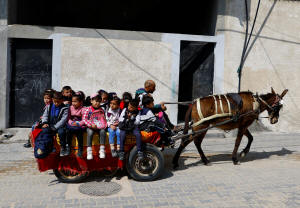|
For those who live too far away or who are too young to make the
trip on foot, and too poor to afford a bus, Loay Abu Sahloul has
a reliable - if slow - alternative: his donkey cart.
Each morning, the 33-year-old Palestinian whistles three times
to summon his passengers, most of them preschoolers, from their
homes in Khan Younis refugee camp. Sometimes as many as 15
clamber aboard.
The earnings are meagre. But Abu Sahloul, who says being a
donkey driver is the only employment available to him due to a
neurological condition, sees the work as a social service.
"These families are in difficult financial conditions. The whole
situation in Gaza is poor," Abu Sahloul said. He charges five
shekels ($1.3) per month for each child.
School buses, by contrast, cost at least 40 shekels a month.
The donkey cart can be hazardous, however. Children are exposed
to the elements and have at times tumbled off.
"I can't afford to send my son on a bus. My heart breaks each
time I see him and the other children on the cart," said
Intissar Al-Araj, one of the parents who use Abu Sahloul's
service.
"Once he fell off the cart and injured his leg. I pray to God
that my kids will be able to take a bus," she said.
(Reporting by Nidal Almughrabi; Editing by Tomasz Janowski)
[© 2023 Thomson Reuters. All rights
reserved.] Copyright 2022 Reuters. All rights reserved. This material may not be published,
broadcast, rewritten or redistributed.
Thompson Reuters is solely responsible for this content.

|
|




